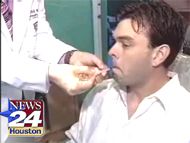Healthy in Houston: Dealing with bad breath
25 July 2003
By Janet Vasil
Mark Flinn is about to be tested for halitosis.
“Most people won’t come up and say ‘Hey, your breath stinks,’ you know? You have to figure it out on your own,” he said.
Mark has come to an expert, Dr. Harold Katz, founder of the California Breath Clinics – a dentist who gave up dentistry to concentrate solely on bad breath.
“One quick test to test if you have bad breath, lick the back of your hand, let that dry for a few seconds (sniff), then smell that,” said Dr. Katz.
Or you can take the more scientific route. Use the Halimeter®, an instrument that measures sulfur compounds in breath samples. The compounds generate the bacteria that cause bad breath.
It’s caused by anaerobic sulfur-producing bacteria,” said Dr. Katz.
“Anaerobic” means the bacteria can’t survive in the presence of oxygen.
“One of the things that we’ve noticed right away is oxygen, which is in saliva is a natural protectant from bad breath. The oxygen stops the sulfur compounds from being detectable,” said the dentist.
Drinking lots of water or chewing sugarless gum can keep saliva flowing. If that doesn’t work, Dr. Katz recommends products that contain oxygenating compounds.
“They actually release oxygen so that you can’t smell the bad breath,” he said.
“The first time that I used it, I noticed a big difference already. The morning breath was gone,” said halitosis sufferer, Dianne Eugenio.
Medications, alcohol, even mouthwash can cause dry mouth and bad breath. But as mark points out, it’s hard to tell yourself if you have a problem.
If you’re concerned, try Dr. Katz’s online breath test. It’s free. And the information may be priceless.
Dr. Katz says a big reason for morning breath is that saliva production slows down during sleep. Drinking water as soon as you wake up can help.




